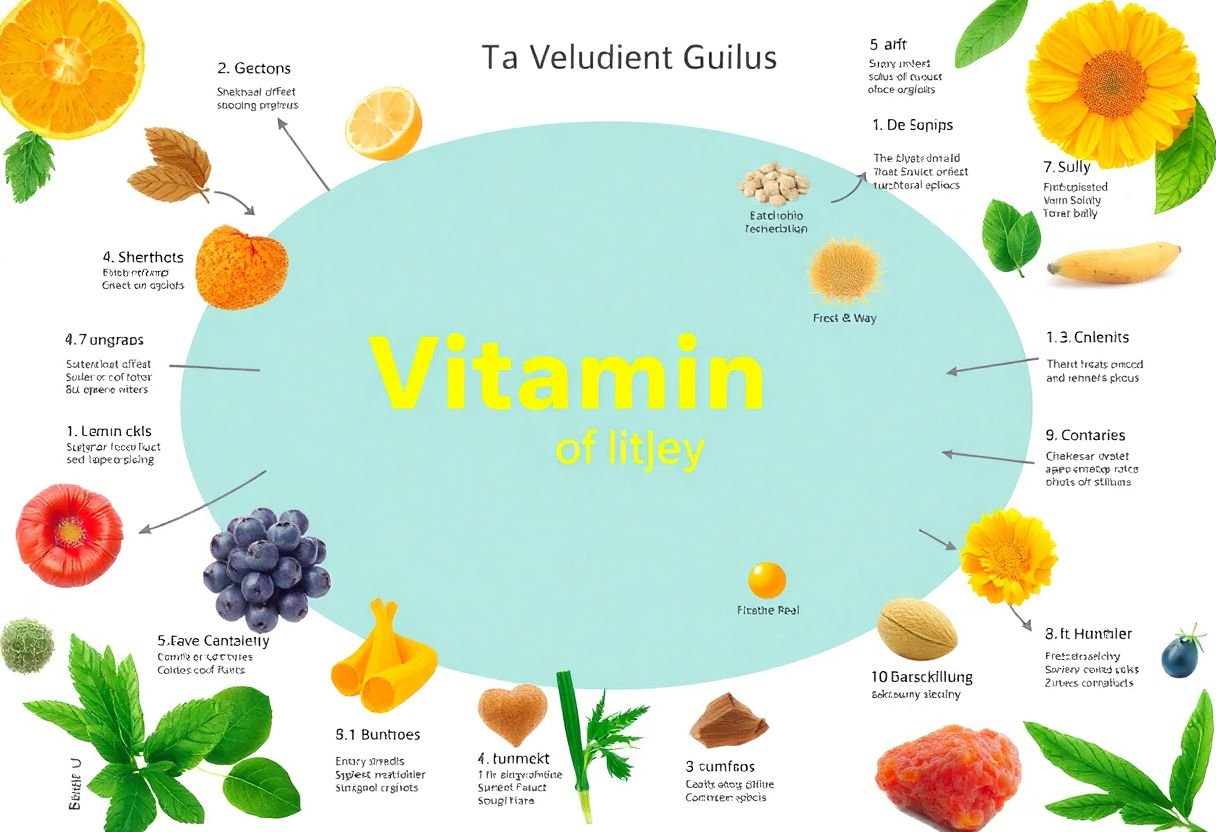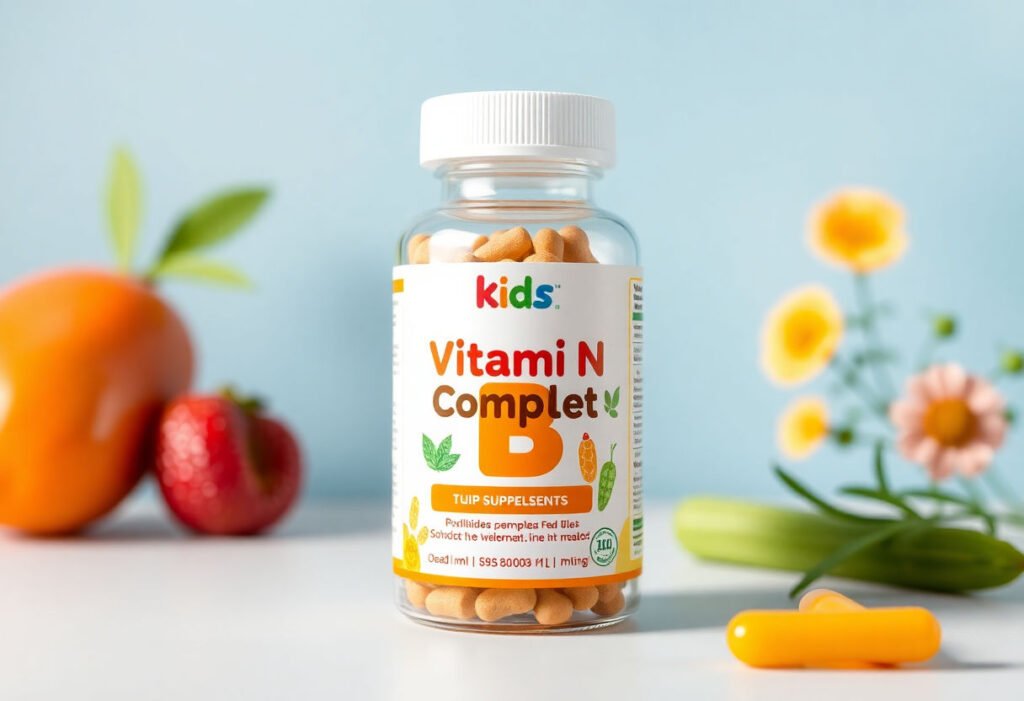Vitamin B Complex is essential for children’s health, playing a crucial role in various physiological processes. It supports everything from energy production and cognitive development to immune system strength and emotional well-being. As parents aim to ensure their children’s optimal growth and development, incorporating Vitamin B Complex supplements into their diet can provide significant advantages. This article explores the many benefits these supplements offer—enhancing energy levels, boosting cognitive function, supporting immunity, and more. Join us as we delve into practical ways to incorporate Vitamin B Complex into your child’s diet, choose the right supplements, and address potential side effects.
Key Takeaways
- Vitamin B Complex is essential for sustaining energy levels in active children, ensuring they remain vibrant throughout the day.
- This group of vitamins plays a crucial role in supporting cognitive development, enhancing memory, and boosting overall brain function.
- A strong immune system in children is fortified by the consistent intake of Vitamin B Complex, keeping illnesses at bay.
- Emotional well-being and mood stabilization in kids are positively influenced by adequate consumption of Vitamin B Complex.
- Incorporating Vitamin B Complex effectively into a child’s diet can promote not only internal health but also a healthy, radiant skin.
What is Vitamin B Complex?

Vitamin B Complex refers to a group of eight essential vitamins that play a pivotal role in maintaining optimal health, especially for children. These vitamins, collectively known as B vitamins, are water-soluble and critical for various bodily functions. The B vitamins include:
- Vitamin B1 (Thiamine): Helps convert nutrients into energy, supporting growth and development.
- Vitamin B2 (Riboflavin): Essential for energy production and the metabolism of fats, drugs, and steroids.
- Vitamin B3 (Niacin): Aids in energy production and plays a role in DNA repair.
- Vitamin B5 (Pantothenic Acid): Necessary for the synthesis of coenzyme A, crucial for fatty acid metabolism.
- Vitamin B6 (Pyridoxine): Involved in amino acid metabolism and the production of neurotransmitters.
- Vitamin B7 (Biotin): Supports the health of skin, hair, and nails, and plays a role in carbohydrate, fat, and protein metabolism.
- Vitamin B9 (Folate/Folic Acid): Important for cell division and the formation of genetic material.
- Vitamin B12 (Cobalamin): Necessary for neurological function and DNA synthesis.
For children, these vitamins are not only necessary for fundamental processes like energy production and metabolism but also essential for growth, brain development, and overall health. Each vitamin contributes uniquely, and together, they ensure that a child’s body functions smoothly. A deficiency in any of these can lead to significant health issues, underlining the importance of a balanced diet or supplements that incorporate the full spectrum of the B vitamins. By understanding what Vitamin B Complex is, parents can make informed decisions about their child’s nutritional needs.
Boosting Energy Levels
Vitamin B Complex plays a pivotal role in enhancing energy levels in children, who often lead incredibly active lifestyles. This group of vitamins contributes significantly to the body’s energy production by converting carbohydrates, fats, and proteins into energy units known as ATP.
Key components of Vitamin B Complex, such as Vitamin B1 (thiamin), act as coenzymes in the metabolism of glucose, offering immediate energy to cells. Thiamin deficiencies, albeit rare, can result in feelings of fatigue and lethargy. Ensuring an adequate intake of thiamin is essential for maintaining optimal energy levels.
Vitamin B2 (riboflavin) also plays a crucial role by aiding in the conversion of food into usable energy. It is essential for the normal functioning of all cells and contributes to metabolic activities that energize children, helping them stay active throughout the day.
Similarly, Vitamin B6 (pyridoxine) is indispensable for the proper functioning of enzymes that facilitate energy metabolism. It also supports the synthesis of neurotransmitters, which can have an indirect impact on energy and vitality by influencing mood and mental alertness.
Moreover, Vitamin B12 (cobalamin) is crucial for preventing fatigue by supporting the nervous system and aiding in the production of red blood cells, which transport oxygen throughout the body. A lack of Vitamin B12 can lead to anemia, characterized by persistent tiredness.
Incorporating a balanced intake of these vitamins through diet or supplements can help ensure that children have the energy they need to engage in daily activities, supporting their physical development and overall well-being.
Supporting Cognitive Development
Vitamin B Complex plays a pivotal role in supporting cognitive development in children, impacting various aspects of brain function and memory enhancement. These essential nutrients include B1 (thiamine), B2 (riboflavin), B3 (niacin), B5 (pantothenic acid), B6 (pyridoxine), B7 (biotin), B9 (folate), and B12 (cobalamin), each contributing uniquely to the cognitive process.
Enhanced Brain Function: The B vitamins are vital for energy production at the cellular level, an essential component for maintaining optimal brain activity. They contribute significantly to the formation and maintenance of DNA and neurotransmitters, which are crucial for the brain’s communication network.
Memory Improvement: Vitamin B6, B9, and B12, in particular, are known for their role in memory enhancement. These vitamins aid in the synthesis of neurotransmitters such as serotonin and dopamine, which are responsible for mood regulation, attention, and concentration. A daily intake of these vitamins supports better memory retention and recall capabilities in children.
Cognitive Flexibility and Focus: The complex also aids in improving children’s cognitive flexibility and focus. Thiamine and riboflavin, for instance, help in converting carbohydrates into glucose, which is the primary energy source for the brain. This conversion process is critical for sustaining attention and cognitive flexibility, allowing for better problem-solving skills in children.
Incorporating a balanced intake of Vitamin B Complex into a child’s diet can be instrumental in fostering an environment conducive to learning and cognitive growth, ultimately setting the foundation for lifelong mental health and success.
Strengthening the Immune System

Vitamin B Complex plays a crucial role in fortifying the immune system, acting as a foundation for children’s overall health. This group of essential vitamins, which includes B1 (thiamine), B2 (riboflavin), B3 (niacin), B5 (pantothenic acid), B6 (pyridoxine), B7 (biotin), B9 (folic acid), and B12 (cobalamin), helps maintain and support various biological functions crucial for a robust immune response.
Vitamin B6, in particular, is vital for immune function as it assists in the production of antibodies that are necessary to combat infections. It also plays a pivotal role in supporting biochemical reactions in the immune system. Proper levels of Vitamin B6 ensure that the immune system functions optimally, reducing the risk of infections and illnesses among children.
Folic acid (Vitamin B9) and Vitamin B12 are essential for the formation of red blood cells and DNA synthesis. A deficiency in these vitamins can lead to a weakened immune response, making the body more susceptible to microbial attacks. Ensuring adequate intake of these vitamins can help in maintaining a healthy immune system, promoting resilience against common illnesses.
Furthermore, B Vitamins facilitate the conversion of food into energy, which supports overall health and stamina, indirectly bolstering the body’s ability to fend off disease. By integrating Vitamin B Complex into a child’s diet through supplements, parents can take proactive measures to ensure their child’s immune system remains strong and active. Regular intake can lead to fewer sick days, supporting continuous growth and development.
Enhancing Mood and Emotional Well-being

Vitamin B Complex plays a crucial role in enhancing mood and emotional well-being in children, primarily due to its involvement in the production and regulation of neurotransmitters. These vital substances are responsible for maintaining healthy brain function and emotional balance.
-
Regulation of neurotransmitters: B vitamins such as B6, B9, and B12 are essential in the synthesis of neurotransmitters like serotonin, dopamine, and norepinephrine. These chemicals influence mood, happiness, and anxiety levels. Ensuring adequate levels of these vitamins can help stabilize mood swings and alleviate feelings of irritability and stress.
-
Stress reduction: Vitamins B1 (thiamine) and B5 (pantothenic acid) are known to support adrenal function, helping the body to manage stress more efficiently. By facilitating better stress responses, these vitamins contribute to an overall sense of calm and mental clarity.
-
Improving focus and concentration: Vitamin B3 (niacin) and B7 (biotin) play roles in brain health that can enhance cognitive functions. Adequate intake of these vitamins is associated with improved focus and concentration, which can lead to better emotional outcomes and a more positive mood.
-
Fatigue reduction: Chronic fatigue can often lead to negative emotional states. Vitamin B2 (riboflavin) aids in energy production and can reduce fatigue, thereby improving overall well-being. A less tired child is more likely to experience a better mood throughout the day.
By supporting these essential functions, Vitamin B Complex supplements can be a beneficial tool in maintaining a child’s emotional health, offering parents a natural way to foster a more balanced and joyful disposition in their children.
Promoting Healthy Skin
Vitamin B Complex plays a pivotal role in maintaining and enhancing skin health in children. This group of vitamins, which includes B1 (thiamine), B2 (riboflavin), B3 (niacin), B5 (pantothenic acid), B6 (pyridoxine), B7 (biotin), B9 (folate), and B12 (cobalamin), is crucial in promoting skin resilience and repair.
-
Biotin (Vitamin B7) is especially well-known for its significant impact on skin health. It’s often referred to as the “beauty vitamin” due to its role in maintaining the skin’s elasticity and smoothness. Biotin deficiency can lead to skin conditions such as dryness and rashes, while adequate intake ensures a healthier complexion.
-
Niacin (Vitamin B3) enhances the skin’s barrier function, which is essential for protecting against environmental damage and reducing moisture loss. It also aids in improving the overall tone and texture of the skin.
-
Riboflavin (Vitamin B2) is another critical component that helps keep the skin clear. It works by assisting in the breakdown of fats and supporting the body’s production of new skin cells, ensuring the skin remains vibrant and free of blemishes.
-
Pantothenic Acid (Vitamin B5) supports the healing processes of the skin, making it particularly beneficial for reducing the risk of acne and skin irritation. It also aids in moisture retention, offering enhanced hydration.
Incorporating Vitamin B Complex into a child’s diet can significantly contribute to maintaining healthy, radiant skin, providing a foundation for optimal dermatological health as they grow.
Choosing the Right Supplement

When selecting the appropriate Vitamin B Complex supplement for children, several crucial factors must be considered to ensure both safety and efficacy. Age appropriateness is a primary concern; supplements are formulated differently based on age groups, thus ensuring the child receives the optimal dosage tailored to their developmental needs. Be sure to verify the recommended age range on the product label before purchase.
Ingredients play a pivotal role in choosing the right supplement. Examine the label for comprehensive information on the types of B vitamins included, as well as any additional nutrients that may support children’s overall health. Opt for supplements free from artificial colors, flavors, and unnecessary fillers. Organic and non-GMO options may offer added peace of mind regarding purity and quality.
Consider the form of the supplement best suited for your child. Some children may prefer liquid supplements or chewable tablets over traditional pills, which can sometimes pose a swallowing difficulty. These alternatives often come in child-friendly flavors, making the intake process more enjoyable.
Another crucial aspect is the reputation of the brand. Choose supplements from reputable manufacturers who adhere to GMP (Good Manufacturing Practices) and have third-party testing for quality assurance. It is beneficial to consult reviews and perhaps seek recommendations from healthcare professionals.
Lastly, bear in mind potential interactions with other medications or existing health conditions. Always consult with a pediatrician or a healthcare provider before introducing any new supplement to your child’s diet to prevent any adverse effects. This thorough consideration will help in making an informed choice, contributing positively to your child’s health and development.
How to Incorporate Vitamin B Complex into Your Child’s Diet
Incorporating Vitamin B Complex into your child’s diet can be a straightforward and rewarding process that ensures they reap the multitude of health benefits it offers. Here are some practical tips to help you integrate these essential nutrients seamlessly:
-
Embrace Whole Foods: One of the most effective ways to supply your child with Vitamin B Complex is through a diet rich in whole foods. Include plenty of leafy greens, nuts, seeds, and lean proteins like chicken and fish, which are rich sources of these vital vitamins.
-
Breakfast Power: Starting the day with a nutritious breakfast can provide a significant portion of the required Vitamin B Complex. Consider options such as whole-grain cereals, fortified breakfast bars, and eggs, which are not only convenient but also packed with these essential nutrients.
-
Creative Snack Alternatives: Swap usual snacks with B vitamin-rich alternatives. For instance, offer whole-grain crackers, cheese, and avocado dips to keep your child energized and healthy throughout the day.
-
Delicious Smoothies: Smoothies can be a delightful and versatile option to boost the intake of Vitamin B. Blend fruits like bananas and berries with fortified milk or yogurt to create a nourishing drink your child will enjoy.
-
Fortified Foods: Many foods are now fortified with essential vitamins, including the B Complex. Consider incorporating fortified grains and plant-based milks into daily meals to enhance your child’s nutrient intake significantly.
By implementing these dietary strategies, you ensure that your child receives an adequate supply of Vitamin B Complex, supporting their overall health and development in a natural and enjoyable manner.
Potential Side Effects and Considerations

Potential Side Effects and Considerations
While Vitamin B Complex supplements offer numerous benefits for children, it is crucial for parents and caregivers to be aware of the potential side effects and considerations associated with their use. Proper dosing is essential to avoid adverse reactions. Taking more than the recommended amount can lead to symptoms such as nausea, diarrhea, or stomach upset. These effects are more common with individual B vitamins compared to a balanced complex that provides all eight B vitamins in appropriate ratios.
Allergens present another consideration. Some Vitamin B Complex supplements may contain allergens such as soy, gluten, or dairy. Careful review of ingredient lists is necessary for children with allergies or sensitivities.
Interactions with other medications should not be overlooked. For instance, Vitamin B6 (pyridoxine) might interfere with certain drugs like anticonvulsants or levodopa, used in treating neurological conditions. Consulting a healthcare provider before starting a supplement regimen is advisable, especially if the child is already on medication.
Moreover, parents should consider the form of the supplement. Chewable tablets, gummies, and liquid forms make it easier for children to consume but can vary in terms of absorption and bioavailability. Opt for supplements from reputable brands that adhere to good manufacturing practices to ensure quality and efficacy.
Finally, it’s vital to remember that dietary supplements should not replace a balanced diet. They should be integrated thoughtfully into a child’s nutritional plan, alongside a diverse range of foods to ensure a comprehensive intake of essential nutrients.
Conclusion
In conclusion, Vitamin B Complex supplements offer a multitude of benefits crucial for children’s health, from boosting energy levels to enhancing cognitive development and immune function. These supplements can be instrumental in supporting emotional well-being and skin health. As parents consider incorporating these vitamins into their children’s diets, it is vital to choose the right supplements and monitor for any potential side effects. Informed use can lay a foundation for a healthier future, empowering children to thrive both physically and mentally.
Frequently Asked Questions
Is Vitamin B Complex safe for children to take daily?
Yes, Vitamin B Complex is generally safe for daily use in children when taken according to the recommended dosage. However, it is important to consult with a healthcare provider before starting any supplement regimen.
What are the signs of Vitamin B deficiency in children?
Signs of Vitamin B deficiency in children can include fatigue, irritability, poor concentration, and a weakened immune system. These symptoms may vary depending on which specific B vitamin is lacking.
Can Vitamin B Complex help improve my child’s focus and concentration?
Vitamin B Complex can support improved focus and concentration since B vitamins play a crucial role in brain health. They aid in the production of neurotransmitters that help enhance cognitive function.
Are there any foods that naturally contain Vitamin B Complex?
Yes, foods such as eggs, dairy products, meat, whole grains, and leafy green vegetables are rich in various B vitamins. Incorporating these foods into your child’s diet can help meet their Vitamin B needs.
How should I choose a Vitamin B Complex supplement for my child?
When choosing a supplement, look for products specifically formulated for children, adhering to age-appropriate dosage guidelines. It’s advisable to select a supplement from a reputable brand and consult a healthcare professional to ensure it meets your child’s nutritional needs.


